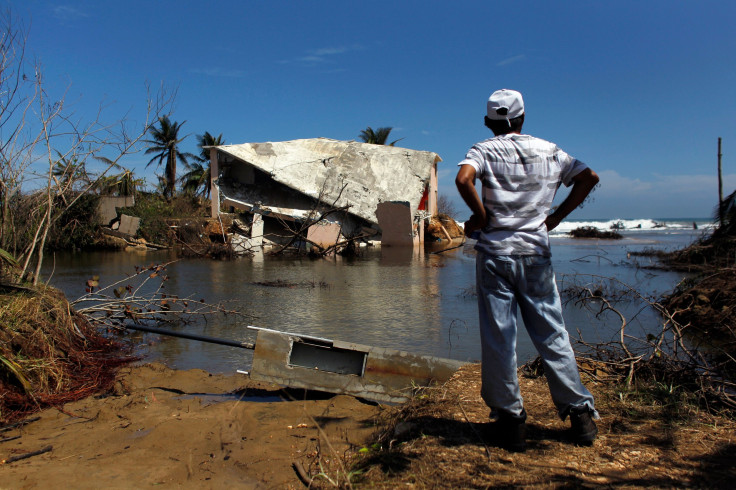Less Talk, More Action Is Needed On Climate Change From Wealthy Nations

One of the most brutal hurricane seasons in history recently came to a close. Seventeen named storms made their way through the Atlantic Ocean. For only the second time ever, two Category 5 hurricanes made landfall — both of which pummeled islands in the Caribbean.
The residents of these small island states — and people in other island nations around the world — face an existential threat from future storms, which are growing ever more powerful because of climate change. These countries need assistance if they're to have any hope of mitigating the effects of climate change. Unfortunately, they're not getting it.
At November's 23rd Conference of the Parties — an annual U.N.-sponsored forum of governments and environmental groups — developed nations declined to provide the aid they had previously promised developing countries. They also fought tooth and nail to avoid discussing how they would reduce their carbon emissions before 2020.
This indifference is grossly unfair. Developed nations caused climate change, yet developing nations stand to lose the most from it.
The Impact of Climate Change
On the island of Barbuda, Irma damaged 95 percent of properties. Every one of the island's residents was evacuated and prohibited from returning for weeks, due to contaminated water supplies and an infestation of vermin. In Cuba, Irma destroyed roads, bridges and water infrastructure. Maria knocked out power to 3.4 million Puerto Rico residents and likely killed more than 1,000 people.
Caribbean island nations aren't the only ones suffering from storms fueled by climate change. This year, Typhoon Damrey devastated the Da Nang region in southern Vietnam. It was the worst to hit the area in 16 years. In Bihar, India, floods killed 370 and left more than 12 million homeless.
Developing countries, particularly island nations, are bearing the consequences of a problem they didn't create. From 1850 to 2011, developed countries produced 79 percent of global carbon emissions, which accelerate climate change by trapping heat in the atmosphere. Small island nations account for less than 1 percent of current emissions.
Industrialized Nations Aren’t Walking the Walk
Industrialized nations have talked the talk about helping developing countries adapt to climate change. But they're not walking the walk. Developed countries that signed the Paris Agreement in 2015 pledged to raise $100 billion each year by 2020 to assist developing countries. The agreement instructed developed nations to "communicate quantitative and qualitative information" about the funding to ensure developing countries could adequately prepare climate plans.
But industrialized nations haven't provided this information — largely because they don't want to make firm financial commitments. At last month's Conference of the Parties in Germany, small, underdeveloped countries called them out.
But by the end of the conference, nothing had changed. Since the pledging conference in 2015, in the last two years, the developed world had ponied up just $10.3 billion for the initial mobilization of resources for the Green Climate Fund. That's nowhere near enough. Developing countries will need up to $175 billion annually just to develop their economies on a low-carbon basis, according to the World Bank.
Industrialized Nations Need to Be Doing More
Developed nations also aren't fulfilling their Paris Agreement commitments to substantially cut emissions by 2020, and that's alarming. Countries need to exceed these pledges, not merely meet them. Even if every country lives up to its initial pledge, global temperatures will still rise more than 2 degrees Celsius, triggering the worst consequences of climate change.
At the Conference of the Parties, developing nations challenged the developed world to take concrete steps to reduce emissions before 2020. Why does 2020 matter? Up until then, the Paris Agreement puts the onus on industrialized nations to cut greenhouse gas emissions. After 2020, all countries, rich and poor, are supposed to make inroads on climate change. The longer it takes for global carbon emissions to peak, the more drastic subsequent reductions have to be in order to have a reasonable chance of staying below two degrees Celsius of warming — and the more we'll be forced to rely on future, unproven and negative emissions technologies.
Developed countries didn't want to discuss the issue. In the end, they simply agreed to review progress on reducing emissions before 2020.
Industrialized nations caused our climate crisis. Yet they appear to be reluctant to help the developing world — especially coastal and island nations — that will suffer most from unmitigated climate change. That's not right.
Hugh Sealy is a professor in the Department of Public Health and Preventive Medicine at St. George's University in Grenada. He has been a lead negotiator for small island states since 2008, including at the historic COP 21 in Paris, the COP 22 Summit in Morocco and COP 23 in Bonn.
© Copyright IBTimes 2024. All rights reserved.





















